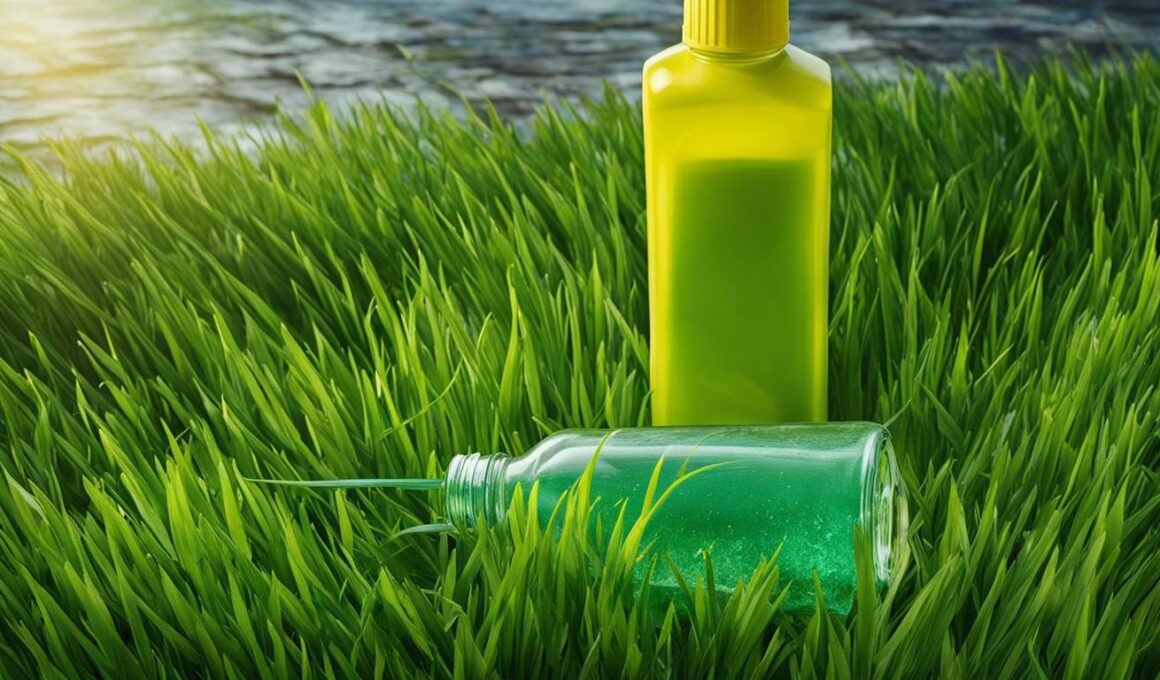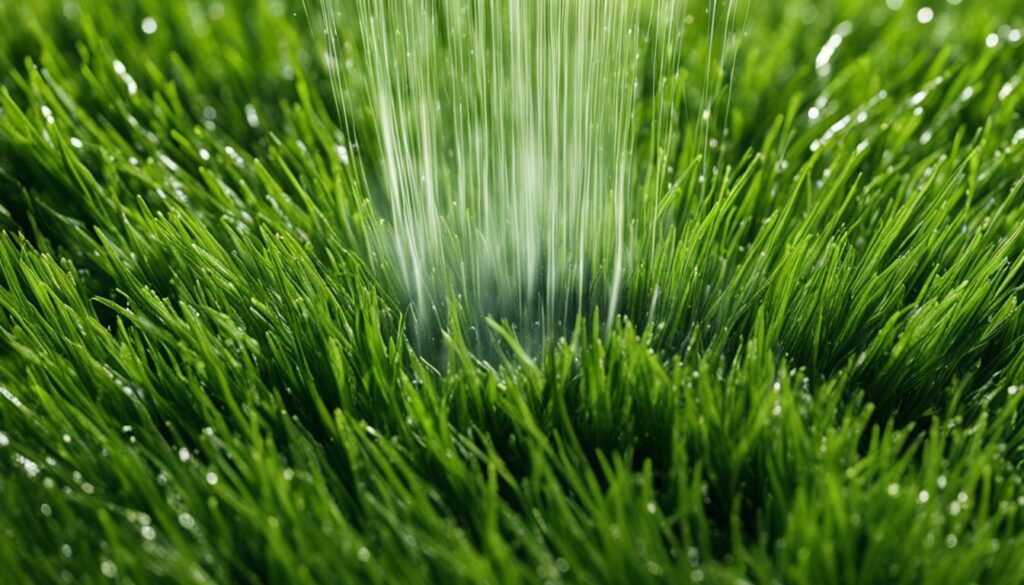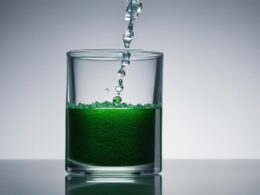Is vinegar a natural weed killer? Many people believe that vinegar can effectively kill grass and weeds in their yards. But is this really true? In this article, we will examine the science behind vinegar as a weed killer and separate fact from fiction.
Post Summary
- Vinegar may damage the leaves of weeds, but it does not eliminate them entirely.
- Vinegar with 5% acetic acid, available in grocery stores, is not strong enough to effectively kill weeds.
- Commercial natural weed killer products with 20% acetic acid can kill small annual weeds, but should be handled with caution.
- Vinegar primarily affects a plant’s ability to produce food, eventually depleting its reserves and leading to its demise.
- For more effective weed control, consider using synthetic or organic herbicides that target the roots of weeds.
The Science Behind Vinegar Weed Killer
Vinegar, specifically household white vinegar with 5% acetic acid, is known to damage the green leafy part of plants. When vinegar is applied to weeds, the leaves wither and turn brown. However, it’s important to note that vinegar has almost no effect on the root system of weeds. Once vinegar reaches soil level, it is quickly neutralized, converting the acetic acid into harmless acetate salts. This means that while vinegar may kill the top growth of weeds, it does not eliminate the plants entirely. Weeds can regrow within a week or so, making vinegar an ineffective natural weed killer for long-term control.
“Vinegar has almost no effect on the root system of weeds.”
To understand why vinegar is not an effective long-term weed control method, it is crucial to consider its impact on plant damage and the regrowth of weeds. While vinegar can cause the leaves of weeds to wither and turn brown, it primarily affects the green leafy part of plants rather than targeting the roots. As a result, the root system of weeds remains intact, allowing them to regrow within a short period. Vinegar’s mode of action at the root level is limited, and its effects on weed control are temporary.
“Vinegar’s effects on weed control are temporary.”
When using vinegar as a weed killer, it’s also important to take into account its non-specific damage to all green plants. Vinegar is not selective and can harm desirable plants, including grass. Its broad-spectrum impact on greenery limits its efficacy as a targeted weed control method. Additionally, vinegar’s effectiveness is more pronounced on seedlings with weak root systems, as a single application can cause their demise. However, repeated applications and consistent timing are necessary to deplete a plant’s food reserves and lead to its eventual death.
“Vinegar is not selective and can damage desirable plants.”
| Acetic Acid Concentration | Effect on Weed Control |
|---|---|
| 5% (Household Vinegar) | Temporary control of weed growth Minimal impact on weed root systems Possible regrowth within a week or so |
| 20% (Commercial Products) | Effective on small annual weeds Depletes food reserves with repeated applications Caution required due to its stronger concentration |
| 7% (Pickling Vinegar) | Can be used as a substitute for 20% acetic acid vinegar products |
The Strength of Vinegar in Killing Weeds
Vinegar available in grocery stores typically contains 5% acetic acid, which is not strong enough to effectively kill weeds. However, there are commercial natural weed killer products on the market that contain 20% acetic acid, which can kill small annual weeds.
It’s important to handle 20% acetic acid with caution, as it is considered a dangerous chemical and should be used with appropriate protective gear. Pickling vinegar, available at some stores, contains 7% acetic acid and can be used as a substitute for the 20% acetic acid vinegar products.
The Strength of Vinegar in Killing Weeds
If you’re considering using vinegar as a natural weed killer, it’s crucial to understand the strength of different vinegar products. While the vinegar you have in your pantry may not be potent enough to eliminate weeds, there are stronger options available.
| Vinegar Type | Acetic Acid Concentration | Effectiveness |
|---|---|---|
| Grocery Store Vinegar | 5% | Weed-killing effect limited |
| Natural Weed Killer Products | 20% | Can kill small annual weeds |
| Pickling Vinegar | 7% | Substitute for 20% acetic acid vinegar |
When using vinegar to control weeds, be sure to follow the instructions provided by the product and consider the potential risks associated with handling higher concentrations of acetic acid. Always prioritize your safety when working with chemicals.
Remember, vinegar alone is not a long-term solution for weed control. While it may kill the top growth of weeds, it does not eliminate the plants entirely. For more effective and targeted weed control, consider using synthetic or organic herbicides that specifically target the roots of weeds.
Finally, keep in mind that vinegar is non-selective and can damage any green plant it comes into contact with, including grass and other desirable plants. Use caution when applying vinegar near your desired plants to avoid unintended damage.
Summary:
- Vinegar available in grocery stores contains 5% acetic acid and is not strong enough to kill weeds effectively.
- Natural weed killer products with 20% acetic acid can be more effective in killing small annual weeds.
- Handle 20% acetic acid with caution and use appropriate protective gear.
- Pickling vinegar with 7% acetic acid can be used as an alternative to 20% acetic acid vinegar.
- Always follow the instructions provided by the product when using vinegar as a weed killer.
- Consider using targeted herbicides for long-term and more effective weed control.
The Limitations of Vinegar Weed Killer
While vinegar can damage the green leafy part of plants, its effectiveness in long-term weed control is limited. One of the main limitations is the need for repeated use. Vinegar may kill the leaves of weeds upon application, but it does not eliminate the roots. To completely eradicate weeds, consistent and timely applications of vinegar are required, which can be challenging for most gardeners.
Furthermore, vinegar primarily affects a plant’s ability to produce food. When vinegar kills the leaves, the plant must rely on its food reserves to regrow new foliage. However, by repeatedly damaging the leaves through vinegar applications, the plant’s food reserves become depleted over time, eventually leading to the plant’s demise. This process requires consistent and continuous applications of vinegar, making it impractical for long-term weed control.
It’s also important to note that vinegar is not selective in its damage. While it may target weeds, it can also harm other green plants, including grass and other desirable plants in your garden or lawn. This non-specific damage makes vinegar a risky choice for weed control, as it can unintentionally harm the plants you want to keep.
| Limitations of Vinegar Weed Killer | Description |
|---|---|
| Repeated Use | Vinegar needs to be consistently reapplied to effectively control weeds, which can be challenging for most gardeners. |
| Plant Food Reserves | Vinegar damages a plant’s ability to produce food, depleting its food reserves over time and eventually leading to the plant’s demise. |
| Seedlings | Vinegar is more effective on seedlings with weak root systems, as a single application can kill them. |
| Non-specific Damage | Vinegar can harm any green plant it comes in contact with, including grass and other desirable plants. |
Conclusion
In conclusion, the idea that vinegar is a powerful natural weed killer is a myth. While it may show some immediate effects on the leaves of weeds, it falls short when it comes to long-term weed control. Vinegar’s inability to target the roots of weeds means that it cannot fully eliminate them from your garden or lawn.
If you’re looking for effective weed control, there are better options available. Synthetic or organic herbicides specifically designed to target the roots of weeds can provide more reliable results. These products have been formulated to effectively kill weeds while minimizing damage to desirable plants.
While the concept of using vinegar as a natural weed killer may seem appealing, it’s important to recognize its limitations. To achieve the best results in maintaining a weed-free garden, consider alternative methods of weed control that are proven to be effective.
Choose effective weed control methods
When it comes to keeping your garden free from weeds, it’s essential to choose methods that offer reliable and long-lasting results. By utilizing appropriate weed control techniques, you can ensure the health and beauty of your outdoor space without relying on vinegar as a natural weed killer.
Remember, effective weed control is key to maintaining the aesthetic appeal of your garden and preventing the spread of unwanted plants. Consider exploring other options available in the market for more efficient and targeted weed control.
FAQ
Is vinegar an effective weed killer for grass?
No, vinegar is not an effective weed killer for grass. While vinegar can damage the green leafy part of plants, it primarily affects their ability to produce food. It does not target the roots of weeds and can damage any green plant, including grass.
What type of vinegar should I use to kill weeds?
Household white vinegar with 5% acetic acid, which is commonly found in grocery stores, is not strong enough to effectively kill weeds. There are commercial natural weed killer products available that contain 20% acetic acid, which can kill small annual weeds. Pickling vinegar, available at some stores, contains 7% acetic acid and can be used as a substitute for the 20% acetic acid vinegar products.
Can vinegar kill weeds permanently?
No, vinegar cannot kill weeds permanently. While vinegar may kill the top growth of weeds, it does not eliminate the plants entirely as it has almost no effect on the root system of weeds. Weeds can regrow within a week or so, making vinegar an ineffective natural weed killer for long-term control.
Does vinegar have any impact on young weeds?
Vinegar can be more effective on seedlings with weak root systems, as a single application can kill them. However, for more established weeds, vinegar is unlikely to have a significant impact on their growth and survival.
What are the limitations of vinegar as a weed killer?
Vinegar’s inability to target the roots of weeds and its non-specific damage to all green plants make it a myth as a natural weed killer. While repeated applications can deplete a plant’s stored food reserves and eventually lead to its demise, this process requires consistent and timely applications, which can be challenging for most gardeners.
Are Greenhouses a Good Way to Protect Grass from Vinegar?
Greenhouses offer surprising greenhouse facts with protection for grass against vinegar. The enclosed environment shields vegetation from the harmful effects of vinegar applications. This allows for the healthy growth of grass within the sheltered confines of a greenhouse.










